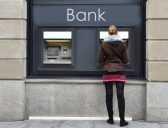Signing up for a bank account is usually easy. But just as an application for a credit card might not be approved, a bank or credit union could deny an account application.
If this happens to you, be aware that you have other options. However, it’s a good idea to try to learn why the bank made the decision. Of the 7 million U.S. households that don’t have a bank account, about 20% say one reason is because of ID verification, credit problems or issues with a former bank account, according to a 2019 Federal Deposit Insurance Corp. survey. Other reasons include customer concerns about keeping the minimum bank balance and inconvenient bank locations.
If you’re unable to open a bank account, here are some tips on what to do next.
Verify your details
When you apply for a bank account, you usually have to provide your name, address, Social Security number and other personal information. Errors in any of these items can affect your application.
Your bank will likely work with third-party companies to electronically verify your application information, says Sarah Hoisington of SentiLink, an identity verification company in San Francisco. If the data can’t be confirmed, the bank is notified, she says.
“Fraudsters sometimes mix real data with made-up data to create a fake identity,” she says. You may be asked to provide additional documentation to prove who you are, such as a copy of your driver’s license, or it may lead to a denial.
If you believe you may have listed incorrect data on your application by mistake, consider reapplying.
Review your consumer reporting files
It’s possible your bank may have confirmed who you are, but denied opening an account because of a record of unpaid bank fees or overdraft charges, for example. Banks rely on consumer reporting agencies such as ChexSystems or Early Warning Services for information on applicant banking histories. When this information causes a denial, you have the right to receive a copy of your file.
The file could list outstanding debts from old accounts, the status of those debts (paid or unpaid) and whether a past account was closed due to suspected fraud. You can use the information from the report to contact the previous bank and pay off any outstanding fees or dispute errors. You could also file a dispute directly with the reporting agency. To reach ChexSystems, call 800-428-9623. For Early Warning Services, call 800-745-1560.
Chip Kohlweiler, vice president of security at Navy Federal Credit Union, says it’s also a good idea to double-check your financial history and personal information with organizations that verification companies might contact, including “entities such as credit bureaus, government agencies and utilities.” For example, you could pull your credit report to confirm its accuracy.
It might seem like an extra step to take, but it actually helps speed up the application process when prospective member information is accurate, he says.
Consider other options
It’s likely difficult to have a bank account approved if you have a consumer reporting agency record. In addition, young adults and recent immigrants may not have a U.S. banking history for these agencies to verify. This may mean you can’t open a traditional account today, but it doesn’t have to stop you from accessing banking services. Here are some other options to consider.
Second chance checking
Some institutions offer second chance checking accounts specifically for customers who can’t qualify for a traditional option. The alternative account might lack some features, such as overdraft protection or the ability to avoid monthly fees, but it gives customers a chance to develop a solid banking history. (Note that this option generally doesn’t involve applying for loans, so it won’t help you build a credit history.)
If you keep a second chance account in good standing for 12 months, your bank may switch it to a regular checking account. Once you reach that milestone, you may be able to shop around for top-notch checking and savings accounts.
Free online checking
If you live far from a branch or are worried about monthly fees, know that you can access some accounts online, and they don’t require a minimum balance or monthly fee.
Prepaid debit cards
Many prepaid debit cards let you access important banking functions, such as direct deposit and electronic bank transfers to help you build an emergency savings fund. They are generally available to customers regardless of banking history. Some of the best choices have no or low monthly fees and access to thousands of ATMs.
Not being able to open a bank account shouldn’t mean not being able to access banking. Whether you resolve the account issue directly with the institution or choose to shop around, there are a number of solid financial service companies that would be happy to have your business.
The post What to Do When You Can’t Open a Bank Account appeared first on Nerdwallet
Original source: Nerdwallet






